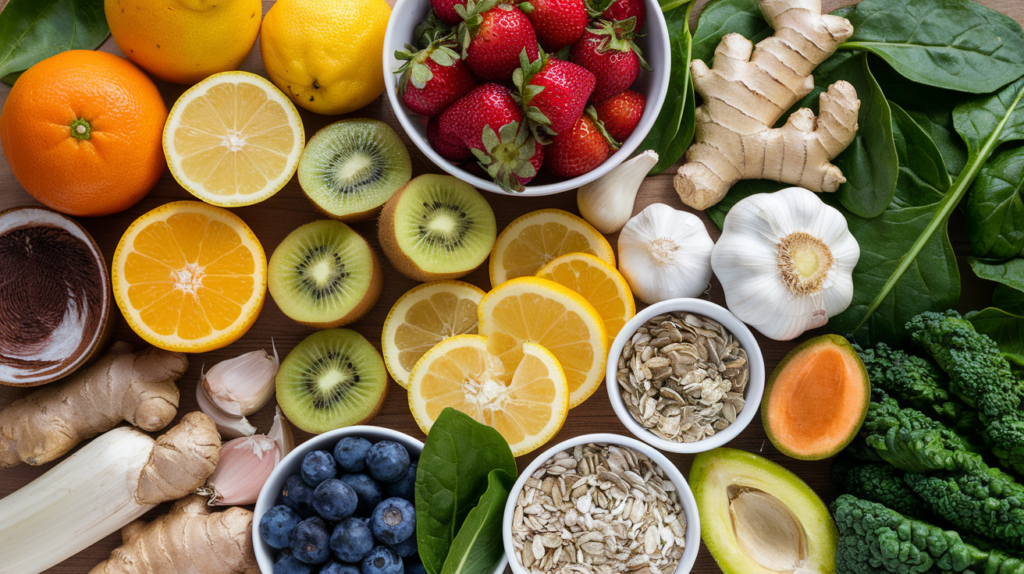People nowadays need a strong immune system in the face of today’s highly demanding and stressful lifestyle. An immunological system can also be referred to as our body’s shield since it acts to prevent sicknesses, diseases, and other diseases causing organisms from penetrating into our body. That’s why it is crucial to regularly exercise, get enough sleep, and minimize stress to boost immunity – but what you eat is where the immune system journey begins. Proper foods enrich the vitamins, antioxidants, and minerals needed for shaping up the immunity power of human body.
Here in turn, in the frame of this blog post, let me share with you the ways how you can improve your immune system and tips on what food you can eat. We shall also look at the individual nutrients are important in immune support and how you can incorporate them into your diet easily.
The best nutrients to help support the body’s immune system
There are a number of different nutrients that have been proven to help support immunity though scientific research. As we shall see below, the major nutrients to be discussed are as follows and the relevant foods sources as indicated;
Vitamin C: The Immunity Superstar

One of the most famed nutrients that are good for the immune system is Vitamin C and for a very good reason. This potent antioxidant works to safeguard cellular mitosis, stimulate proliferation of leucocytes which are instrumental in defense against diseases and strengthen skin’s first line of defense against infections.
Foods rich in Vitamin C:
- Fruits containing vitamin C (Oranges, Lemons, Grape fruits).
- Red bell peppers This is a colorful vegetable, which contain more vitamin C than oranges Then Household Products:
- Strawberries
- Kiwi
- Broccoli
- Kale
How to include Vitamin C in your diet:
- Take the first glass of fresh orange juice before you start the day or have a kiwi and strawberries smoothie.
- Red bell peppers may be eaten raw in salads, cooked in stir-fries, or incorporated into any dish that could use a boost of Vitamin C.
- Take oranges as part of fruits of the healthy snacks, or include them into your sweet recipes.
Zinc: They are known as the Wound Healer and Infection Fighter.
Zinc is invaluable in immune response. Aids in mobilizing white blood corpuscles which are used by the body to fight against bad bacteria and other viruses, aid in the body’s healing process. Low levels of zinc compromise immune system and make the body vulnerable to diseases.
Foods rich in Zinc:
- Shellfish: essential As with all seafood, the cultivation of shellfish (particularly oysters) is vital.
- Beef and poultry
- Pumpkin seeds
- Chickpeas
- Cashews
- Fortified cereals
How to include Zinc in your diet:
- Taste some seafood with oysters, or you might prefer a stir-fried beef and some vegetables.
- Pumpkin seeds are good eaten raw and can be added in salad or roasted cashews can be taken as they are as a snack.
- They can be added to soups, stews or just eaten as a humble hummus dip.
Vitamin D: The Immune Modulator
Vitamin D which is also referred to as the sunshine vitamin, is important in the regulation of body immune system. It helps stimulate immune cells, so that your body is able to fight off infections. It is noteworthy that a Vitamin D deficiency has been associated with such infections especially in the respiratory system.
Also read: Healthy and Unhealthy Food for Kids
Foods rich in Vitamin D:
- The intake of fatty fish such as salmon, mackerel and sardines.
- The second had consisted of fortified milk and dairy products.
- Egg yolks
- These include; mushrooms; veggies seen to grow by sun light.
How to include Vitamin D in your diet:
- Cook fat fish such as salmon by grilling or baking for dinner.
- Choose to take the foods that are fortified with vitamin-D or dairy, such as calcium eased milk, almond milk or soya milk.
- Include mushrooms into omelets, soups or stir-fry meals.
Vitamin E: The Antioxidant Protector
Vitamin E is really a fat soluble antioxidant that protects the cells from the ravages of oxidative stress and plays crucial role in maintaining immunity. It stimulates the activity of immune cells that in return help the body to fight diseases causing organisms.
Foods rich in Vitamin E:
- Almonds
- Sunflower seeds
- Spinach
- Avocados
- Hazelnuts
- Peanut butter
How to include Vitamin E in your diet:
- In fact, consume a portion of almonds or sunflower seeds.
- You should try adding avocado to your sandwiches or salads.
Probiotics: The Gut’s Best Friend
Proper digestion is important to boost the body immune system. Probiotics can commonly be defined as the helpful bacteria that inhabit the human gastrointestinal tract and assist the immune system by maintaining the health of bacteria that live in the intestines. Many experts point out that around 70% of your immune system is in your stomach, something that means that you have to be very specific when it comes to what you feed your body.
Foods rich in Probiotics:
- Probiotic foods such as yogurt (with live and active cultures)
- Kefir
- Sauerkraut
- Kimchi
- Miso
- Tempeh
How to include Probiotics in your diet:
- In the morning, try to eat a bowl of yogurt or kefir with addition of fruits and seeds.
- Always try to use fermented foods such as sauerkraut or kimchi as a side dish or for topping.
- Throw the miso paste into your soup recipes or include it as an ingredient in your salad dressing.
Immune-Boosting Meal Ideas
To show you how you can include these immune boosting vitamins in your diet, here are some simple meal plans with the vitamins mentioned above.
Breakfast: Immune Power Smoothie
Whiz together in a blender one cup spinach, ½ cup nonfat yogurt, one kiwi, several strawberries, one tablespoon ground flax seed (to boost the fiber and omega-3), and a half cup orange juice to give your immune system a blast at breakfast.
Lunch: Citrus and Spinach Salad
Mix fresh spinach with pieces of oranges, avocado, cooked chicken breast and pumpkin seeds. Top it up with a mere olive oil and lemon dressing to be fit and elegant for a healthy salad.
Dinner: Oven Baked Fish and Vegetables
Savor a cup of garlic and herb flavored baked salmon fillet eaten together with roasted broccoli, red bell peppers, and sweet potatoes. Everything in this meal is rich in vitamin D, antioxidants, and fiber, which makes your immune system very strong.
Snack: Almonds and Sunflower Seeds
Consume a few handfuls of both raw almonds and sunflower seeds in between the meals as vitamin E and good fats help support immune health.
Dessert: Probiotic Yogurt Parfait
Spread the yogurt, layer it with the melted frozen berries, sprinkle the flaxseeds and lastly, sprinkle the honey all over. This delicious desert is not only will fill your sugar craving but also improves your digestion.
9 Non-Diet Habits That Support Nutritious Eating
As much as nutrition is concerned, it is always recommended that good nutrition is very important in building immunity but we should not forget that other things also count. Here are a few additional tips to help your immune system function at its best:
- Stay Hydrated: Water intake is important for the immune system to work well thus, it is crucial to take enough water. Drinking enough water dilutes toxins in the body hence gets rid of them while ensuring that the cells in the body work well.
- Get Enough Sleep: The body repairs and regenerates itself when you are sleeping. Lack of sleep has a negatively impact on the immune systems, therefore increasing the vulnerability to get affected by the flu virus.
- Exercise Regularly: Physical activity improves blood flow and assists in reducing inflammation that will in turn assist in physical immunity.
- Manage Stress: from stress and include some relaxation that will build up your immunity such as deep breathing meditation, yoga and many others.
Fortifying your immune system can not be a rather tricky affair. Accepting Citrus fruits, fatty fishes, leafy green vegetables, nuts, seeds and fermented products you can help your immune system on its own. In addition to these dietary changes, eating healthy balanced diets with regular exercise, quality sleep, and reduce stress levels will improve the immunity and be healthy all through the year.

